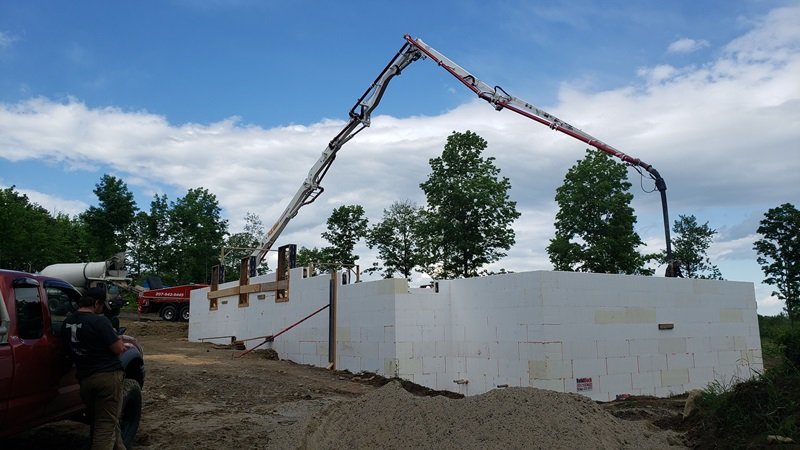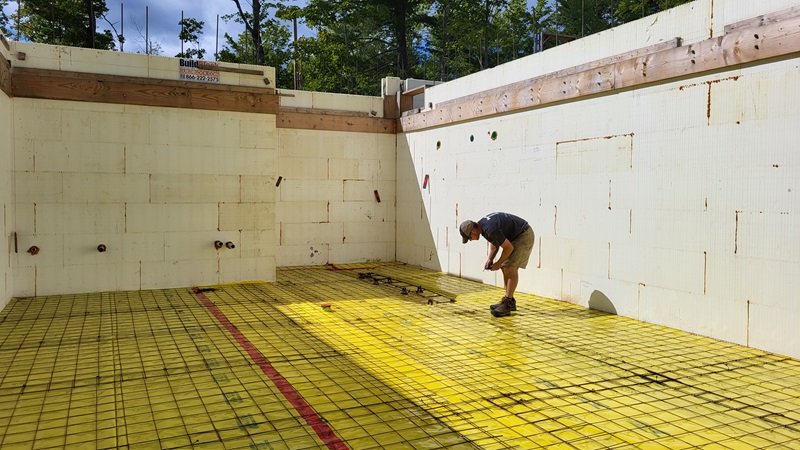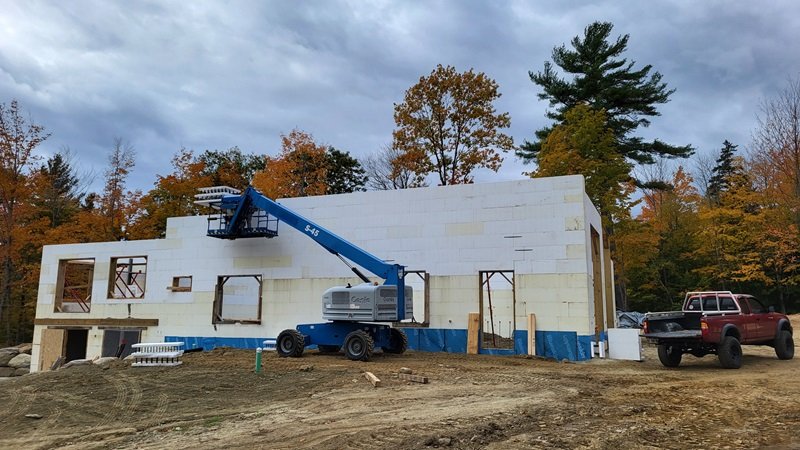
Energy-Efficient ICF Homes
What is ICF?
ICF or “Insulated concrete forms” are hollow foam blocks that are stacked together similar to Legos. These foam blocks come in various sizes and are locked together to form your foundation and walls. The hollow center is reinforced with rebar and poured with concrete. You are left with a wall that is insulated on both sides with 2.5” of Expended polystyrene foam. The foam forms are permanent. They are not removed, and they can be treated as any other home. With buildblocks radius blocks we can do almost any combination of curved and straight walls your build requires. There is a common misconception that ICF homes cannot have the same finishes as traditional homes. This simply is not true. Almost any exterior can be utilized and installed. In most cases the interior dry wall is secured directly to the ICF forms.
With buildblocks ICF forms there are 1.5” (same width as a 2x4) screw points every 6”. These screw points are utilized just as any stud would be in a traditional framed house. To run exterior plumbing and electrical we simply carve out a path for the services and spray foam back over them once completed. This does not affect the insulation or efficiency of your home.
It is no secret that it seems like mother natures storms are stronger and more frequent than ever before. If you have been doing any research on ICF homes, you have certainly seen the photos of the lone house standing on a beach front after a hurricane. Or the lone houses in a cul-de-sac where fire ravaged the homes. It is commonplace to find stories of ICF homes standing the test of mother nature. Pair your ICF home with a metal roof, and retardant rain screen, you are nearly indestructible!
There are probably several homes in your area that are ICF and you didn’t even notice! We would encourage you to come check out one of our builds and see the possibilities for yourself!
Advantages of ICF
Mold, rot, mildew, and insect resistant. The EPS and concrete will last for 100s of years if covered and protected.
Sound blocking with an STC of 51+. Around 3 times quieter than a wood-framed house.
Secure bulletproof walls with steel-reinforced concrete. Tornado, hurricane, and earthquake resistant. 10x stronger than wood-framed homes.
Fire rating of 4+ hours
Withstand force 5 storms, 200mph
Lower insurance premiums
75% reduction in air infiltration for healthier, comfier homes
Continuous insulation barrier. Zero thermal bridging. Independent testing says 58% more efficient than traditional built homes.
Comfortable and energy efficient due to the concrete’s resistance to temperature changes. You will feel cool in the summer and warm in the winter. Studies suggest 40-60% increased energy efficiency.
True monolithic walls
Homes built for centuries, not decades
Reducing homeowner costs in the long run and increasing resale value
The Build Process
Here at Mariner Construction, we use the Build Block ICF system. Each ICF system has slight variances, but they all accomplish the same goal. Providing extremely efficient, safe, healthy, strong homes. The ICF process accomplishes several construction steps all in one. Framing, insulation, vapor, and air barrier. Most contractors who are familiar with ICF can complete the framing in a shorter time period because the forms are so light, and the system is easy to teach.
A common question home buyers ask is, “If ICFs are so great, why isn’t everyone using them?” The answer is two-part and simple:
First, although ICF technology has been around for decades and is continually improving in both function and affordability, it’s still relatively unknown to the general public and traditional homebuilders. There’s no doubt you’ll see more and more ICF construction as people become educated about its many benefits. The efficiency code for newly built houses is ever increasing. If you want to build a ‘future proofed’ home today ICF is your choice. ICF easily meets the strict air tightness requirements that many municipalities are adopting. Not to mention you are building equity in your house that is going to be desirable to resale in the future.
Second, building an ICF home benefits you, the home buyer, not necessarily the homebuilder. Obviously, a builder benefits from the increased satisfaction of their customers’ experience with an ICF home, but that’s a long-term payoff. In the short run, it costs more to build, it’s less familiar to them, and frankly, it’s less profitable than slapping up a good old wood frame home. So, a home builder who is unfamiliar with ICFs is not going to educate you about this far superior option. I am sure you all know a few builders who are ‘old school’. They simply do not have the experience to see an ICF project from start to finish. If they lived in an ICF home, we are sure they would believe in the benefits as well!


































